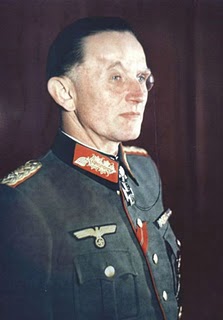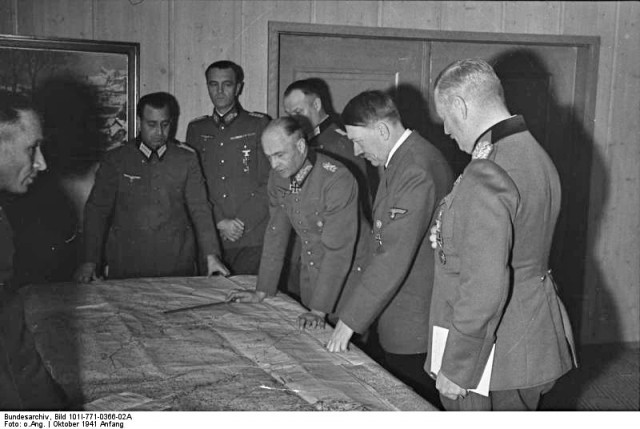
This is General Dietrich von Saucken. As you can see, he is literally the archetypal monocled patrician Prussian general.
In World War I, he was wounded seven times in battle, and decorated very highly for valour. He stayed in the German army, and at one point was posted to Russia, where he learned to speak the language.
He served in numerous battles of World War II, being decorated many more times. He had a reputation for trying to save as many of his men as possible.
A month later he was reinstated – he was too good a general to do without.
Hitler summoned von Saucken to his bunker, gave him his orders – to defend Prussia against Russia.
Nervous glances were being exchanged by Hitler’s minions. Hitler didn’t appear to notice von Saucken had already openly displayed contempt for him.
He had strolled in casually, wearing his cavalry sword (forbidden in Hitler’s presence), and had given him a slightly apathetic military salute, instead of the Nazi salute which had been compulsory for all officers in Hitler’s presence since the previous year.
von Saucken was eyeing his boss with open loathing. Hitler casually threw in “and you will be reporting to Gauleiter Forster” – the local Nazi party leader.
This was not going to work with von Saucken. A Prussian general taking orders from some party functionary?
von Saucken gave Hitler a withering look. The facial equivalent of “get lost, corporal“. Hitler didn’t notice, he was staring at his maps on the table.
Dietrich von Saucken leaned over the table and slammed his hand down on it. That got Hitler’s attention.
von Saucken looked him in the eye and said “I have no intention, Herr Hitler, of taking orders from a gauleiter!”
I imagine one must have been able to hear a pin drop. Fegelein was shot for less than that. von Saucken had openly rebelled – refusing a direct order from Hitler and belittling him by addressing him as Herr Hitler and not, as regulations demanded, mein Führer.
 Hitler studying maps of Russia in October 1941 via Bundesarchiv
Hitler studying maps of Russia in October 1941 via BundesarchivThere was silence for a while. Hitler said quietly “Alright Saucken, have command of it yourself“.
He waved the general away. von Saucken made a faint pretence of a bow (and again no Nazi salute), turned his back on Hitler and left, never to see him again.
What amazes me most about this story is that Hitler, the man who men feared to disobey or insult, simply caved in when confronted by a better man. And in front of his staff too. If more men had been like von Saucken then a whining talentless lazy brat like Hitler could have been stopped before he ruined his country.
von Saucken commanded his men with distinction to the very last day of the War. He was told to leave Prussia by ship during the evacuation, but carried on fighting, sending back injured men instead.
Just before the very end, a plane was sent for him to escape on so he could avoid Russian captivity. He refused to leave his men, and sent the plane back with injured soldiers on it instead.
On the 8th of May, the official end of the War in Europe, he was given his final military decoration, and was the final German to be decorated in the War.
Predictably, the Russians treated him vilely. He would have known that would happen when he refused to abandon his men. The physical tortures the Russians inflicted on him left him in a wheelchair for the rest of his life.
After ten years’ captivity, Dietrich von Saucken was repatriated and retired to Bavaria, where he took up painting.
He was a conservative, and probably somewhat nationalistic. He wasn’t a resistance fighter, he had no known involvement with the von Stauffenberg plotters, so he won’t be on any German stamps.
But I believe he represents the very best of the traditional German cavalryman, and that if the rest of the German armed forces had been made of men like Dietrich von Saucken, there would have been no war crimes, no crimes against humanity, probably no Second World War at all.
And if the German general staff of World War I had all been made of men like him, my country – the United Kingdom – might have been a German colony by 1918.
Originally written by Nigel Mountford on Quora reproduced with permission.
Bibliography
Beevor, A. Berlin the Downfall: 1945
Boldt, G. Hitler’s Last Days: An Eye-Witness Account

Δεν υπάρχουν σχόλια:
Δημοσίευση σχολίου